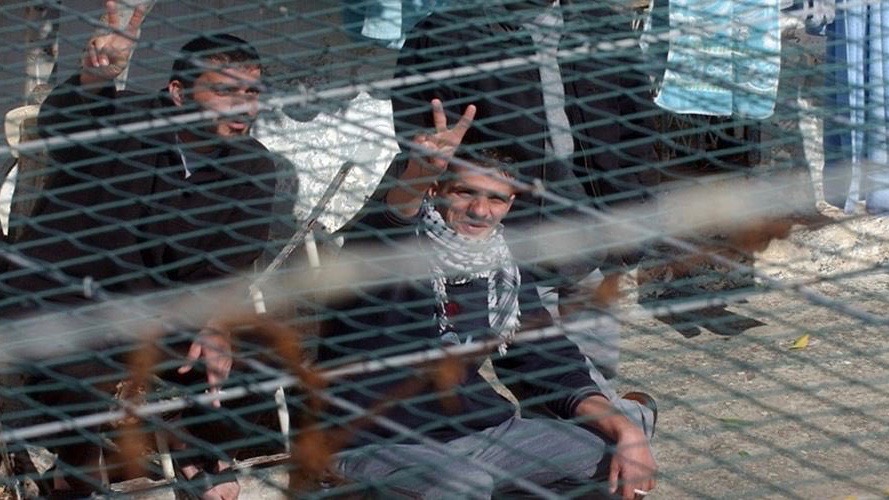Palestinian prisoners are set to escalate their resistance actions against the increasing brutality of the Israeli occupation with a mass hunger strike, to begin on March 22, coinciding with the start of the holy month of Ramadan.
On Sunday, March 19, Palestinian prisoners released their “collective will” ahead of their protest titled the “Volcano of Freedom or Martyrdom.”
It states, “After finding ourselves alone in the face of death and oblivion, struggling against the impossible as besieged prisoners until the end, between the jaws of neglect and the fangs of the colonial Ben-Gvir [Israel’s Minister of National Security Itamar Ben-Gvir] we have decided, based on the faithful wills stemming from our revolutionary and humanitarian consciousness, to rely on Allah and the will of our living people, and to launch ourselves as arrows from the strings of our rebellious souls.”
“We shall either achieve a red freedom, stained with hunger and dignity (martyrdom), or we shall achieve a certain victory over ourselves and the world together.”
The Palestinian Prisoners’ Club has stated that Marwan Barghouti (Abu al-Qassam), a militant leader and member of the Fatah Central Committee, will be at the forefront of the hunger strike.
The strike marks the culmination of an ongoing civil disobedience protest by Palestinian prisoners, which entered its 35th day on March 20, and includes actions such as organizing sit-ins, refusal of meals, continued wearing of brown uniforms, and acts of disruption like shutting down prison sections and resisting security checks. Palestinian prisoners have also organized “night confusion” activities, raising the chant of “freedom.”
The civil disobedience and impending hunger strike are a response to the dehumanizing punitive measures imposed by Ben-Gvir since he assumed office in January. Since then, added restrictions have been placed on Palestinian prisoners’ access to running water and exercise time. Shower times are limited and bakeries have been shut down to deny prisoners access to fresh bread. The number of raids and searches, as well as the number of people in solitary confinement, has also increased.
Prisoner advocacy group Addameer reported the harsh treatment of 29 female Palestinian prisoners in the Israeli Damon prison, including violent raids and bans on family visits.
Meanwhile, Ben-Gvir is also pushing brutal legislation in the Knesset, including to authorize the execution of Palestinian prisoners and to end funding for their medical treatment. Israel has also approved measures to strip Palestinians prisoners of their citizenship or residency, and have their assets and funds seized.
The violence being meted out to Palestinians in Israeli prisons is not isolated. This has been accompanied by fatal raids on Jenin and Nablus, the demolitions of Palestinian homes, and the Israeli apartheid regime’s public support of settler pogroms.
In their statement on Sunday, Palestinian prisoners called upon the broader Palestinian society to mobilize in solidarity, saying “Do not leave us alone in the battlefields, exposed to the invaders’ arrows. Protect our souls and backs…Liberate us while we are still alive before we become dead bodies and numbers. Free us from our cold iron tombs…Free us from the graveyards of the living, before we turn into forgotten tombstones in the [occupation’s] cemeteries of numbers.”
March 14: Palestinians protest in #Gaza in support of prisoners held in Israeli colonial jails. Palestinian prisoners announced an action plan as a protest against the harsh treatment they have received since Itamar Ben Gvir was appointed as Israeli national security minister. pic.twitter.com/wORw8EjPkv
— Activestills (@activestills) March 16, 2023
The collective statement further says, “We entrust you with seven heavy core essentials:
Palestine and its historical narrative, the resistance in all its forms, national unity, the families of martyrs and prisoners, the Palestinian woman as guardian of our sacred fire, Palestinian democracy and political pluralism in the revolutionary consciousness, and the unifying national identity.”
“We also entrust you with with the four liberating geographies: the geography of martyrs—the model and symbol, the geography of prisoners—titles of action and obligatory freedom, the geography of the refugee camp—essence of the cause and the right of return, and the geography of the student movement—awareness and youthful vigor.”





